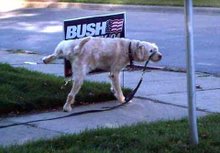
Sure as shit. Another classic. The Decider decided. No consultation with anybody. Fucking criminal moron.
“Unfortunately, yes, the way that decision was taken was typical,” Powell said. “Done! No full deliberations.
--------------------------------------------------------------------------------
August 27, 2007
Op-Ed Columnist
The MacArthur Lunch
By ROGER COHEN
United Nations
Zalmay Khalilzad, the American ambassador to the United Nations, is a twinkle-eyed hawk. The defeat of Soviet imperialism in Afghanistan, the unfinished business of the 1991 Persian Gulf war and his own liberating odyssey from an Afghan childhood to the University of Chicago convinced him the world needs the transformational power of the United States.
Since 9/11, he has fared better than most of the Bush brigade. As a Beirut-educated, Farsi-speaking Sunni Muslim, he actually has a clue about the Islamic world. He was prepared to sip tea rather than set edicts.
In his shepherding of Hamid Karzai to power in Kabul, his forging of Sunni cooperation now bearing fruit in Iraq’s Anbar Province, and in his recent prodding of the U.N. to a fuller Iraqi role, “Zal,” as he’s known, has suggested shrewdness explains the twinkle.
So, as the September storm clouds gather over America-in-Iraq, I was intrigued to find Zal looking back in anguish. President Bush now alludes to “the mistakes that have been made,” but is unspecific. There’s such an array, everyone has a favorite: a nonexistent casus belli, skimpy troop levels, the end of the Iraqi army, aberrant planning.
Khalilzad’s anguish centers on May 6, 2003. That’s the day he expected Bush to announce his return to Iraq to convene a grand assembly — something like an Afghan loya jirga — that would fast-forward a provisional Iraqi government.
Instead, the appointment of L. Paul Bremer III to head a Coalition Provisional Authority was announced. Khalilzad, incredulous, went elsewhere. In the place of an Afghan-American Muslim on a mission to empower Iraqis, we got the former ambassador to the Netherlands for a one-year proconsul gig.
“We had cleared both announcements, with Bremer to run things and me to convene the loya jirga, both as presidential envoys,” Khalilzad told me. “We were just playing with a few final words. Then the game plan suddenly changed: we would run the country ourselves.”
Alluding to former Secretary of State Colin Powell and his successor, Condoleezza Rice, who was then national security adviser, Khalilzad continued: “Powell and Condi were incredulous. Powell called me and asked: ‘What happened?’ And I said, ‘You’re secretary of state and you’re asking me what happened!’ ”
Powell confirmed his astonishment. “The plan was for Zal to go back,” he said. “He was the one guy who knew this place better than anyone. I thought this was part of the deal with Bremer. But with no discussion, no debate, things changed. I was stunned.”
The volte-face came at a Bush- Bremer lunch that day where Bremer made a unity of command argument to the Decider. “I put it very directly to the president: you can’t have two presidential envoys running around Iraq,” Bremer told me.
A MacArthur-Karzai debate had raged within the administration for months: should the United States run Iraq like Gen. Douglas MacArthur in postwar Japan or seek a local Karzai-like leader and operate behind the scenes?
Bremer still believes the MacArthur route was imperative. An exile-dominated Iraqi government would have had no legitimacy or competence. Nor would it have changed the legal fact of the U.S. occupation.
“The way we did it gave Iraqis the best chance of a sustainable political process,” he argued.
Nonsense, Khalilzad believes. “I feel strongly that the U.S. ruling was wrong. We could have had an interim Iraqi government. I argued, based on Afghanistan, that with forces, diplomacy and money, nothing can happen anyway without your support.”
Powell agrees. “Everything was Bremer, the suit, the boots, the whole nine yards.” It was a mistake not to move “more rapidly to putting an Iraqi face on it.”
Khalilzad and Powell are right. The insurgency that took hold after Bremer’s arrival had a clear target: the guy in Timberlands. Given the extent of its post-cold-war power, the United States must wield it with subtlety. This was the sledgehammer approach.
And chosen over lunch. “Unfortunately, yes, the way that decision was taken was typical,” Powell said. “Done! No full deliberations. And you suddenly discover, gee, maybe that wasn’t so great, we should have thought about it a little longer.”
Do such mistakes redouble American responsibility in Iraq or demonstrate the hopelessness of the task? I say the former. The little miracle of Khalilzad’s free-thinking life is just one example of the positive transformations this country can fashion when resolve and coordination shape policy, not precipitous whim.
•
You are invited to comment at my blog: www.iht.com/passages.
Nicholas D. Kristof is on book leave.
Copyright 2007 The New York Times Company



No comments:
Post a Comment